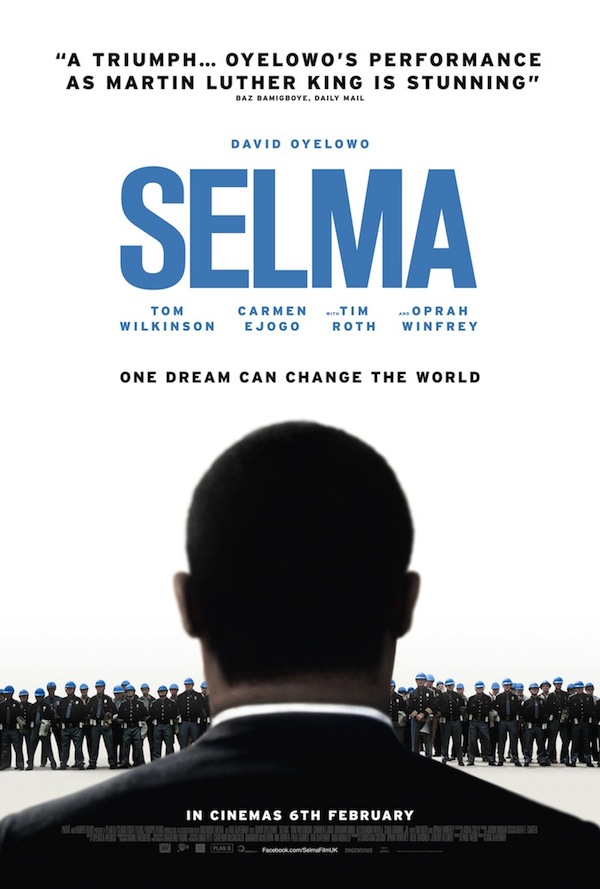‘Selma’ lives up to MLK’s legacy
Martin Luther King Jr. has his solidified place in history; his work during the civil right’s movement was essential in getting African-Americans the right to vote. The story we don’t hear is the difficulties that followed getting the right to vote. Poll taxes and tricky voting requirements kept black people from being able to vote in many areas across the country. The film “Selma serves both as a biopic for MLK and as a telling of his story in Selma, Alabama, organizing a protest to remove all voting requirements for adults. Tackling someone who is arguably the most important historical figure of the 20th century is no easy task. It’s easy to get taken away with artistic license in regard to the history of the character, because sometimes history just isn’t that dramatic. Despite a few historical inaccuracies, “Selma” provides a powerful representation of King.
The civil rights movement, by a large majority of the public, was considered settled with the passing of the Civil Rights Act of 1964, unfortunately the battle was far from over. Many blacks were still denied the right to vote on the basis of laws carried out at the discretion of polling houses. Often those houses were manned by racists and governed by a chain of command told them to make it as hard as possible to give voting rights to blacks. Martin Luther King Jr., played by David Oyelowo, is very upset by this, and starts using his political connections to talk with Lyndon B. Johnson, who was president at the time. LBJ tells MLK that he has bigger fish than Civil Rights to fry, which drives King to take a more radical approach: staging a series of peaceful protests in order to raise national awareness.
What makes this story so fascinatingly interesting is the complex motives behind choosing Selma as the location for these protests. Alabama was notoriously racist at the time, and staging civil right’s protests there was just asking for trouble, and trouble was not hard to find. Almost every single protest King and his followers stage ends in violence, with black people being beaten, bruised, and in some cases, shot and killed, by police no less. MLK had to take more radical moves to get national attention, his goal is one of awareness, and he was fully aware that there were going to be tragedies and casualties. Civil disobedience is risky, when people in your movement start to die, it’s easy to lose faith, and only a leader of MLK’s stature could keep spirits high in such an awful situation. When Oyelowo delivers his sermons at a largely black church in Selma, there is an intense power behind his voice. The performance is so brilliant and harrowing that as an audience member, he had me right by his side, motivated to fight against the oppression.
The aforementioned historical inaccuracies come in the portrayal of LBJ, who is portrayed as a sort of roadblock for the civil right’s movement. In reality, he was paramount to the passing of the Voting Rights Act, and put civil rights at the top of his priorities. A recent “Time” magazine article titled “Why You Should Care That Selma Gets LBJ Wrong” praises the movie for it’s historical research but knocks it for it’s portrayal of LBJ’s politics. Despite this, Tom Wilkinson delivers a fantastic performance as LBJ. His wiry and dismissive attitude towards King provides great opportunity for drama and the scenes he has with Oyelowo are some of the best in the movie. Viewers can sense the frustrations of the black community in every scene. They try so hard to have their cause taken seriously, while racist politicians such as then-Alabama Gov. George Wallace, played by Tim Roth, do everything in their power to maintain their “way of life.” Roth plays an astonishingly good racist, and it’s sickening to believe that these types of people were in office at the time.
Selma provides a lens through which to view the civil right’s movement in a broader context. Of course it was necessary to get legislation passed, but that was going to happen only with the larger population’s approval. By larger population I mean primarily white people, which is sort of an unfortunate reality that it took the incorporation of white people for the civil right’s movement to be taken seriously. It does make the point however that civil right’s was first and foremost a social movement before a political one. This illustration of social progress taking place feels incredibly real. The setting is so convincing, it’s almost foreign. It’s hard to believe how poorly Americans were treated merely 50 years ago, and with time great progress has been made. “Selma” is a wonderful biopic that honors Martin Luther King Jr. with all the respect he deserves.














































